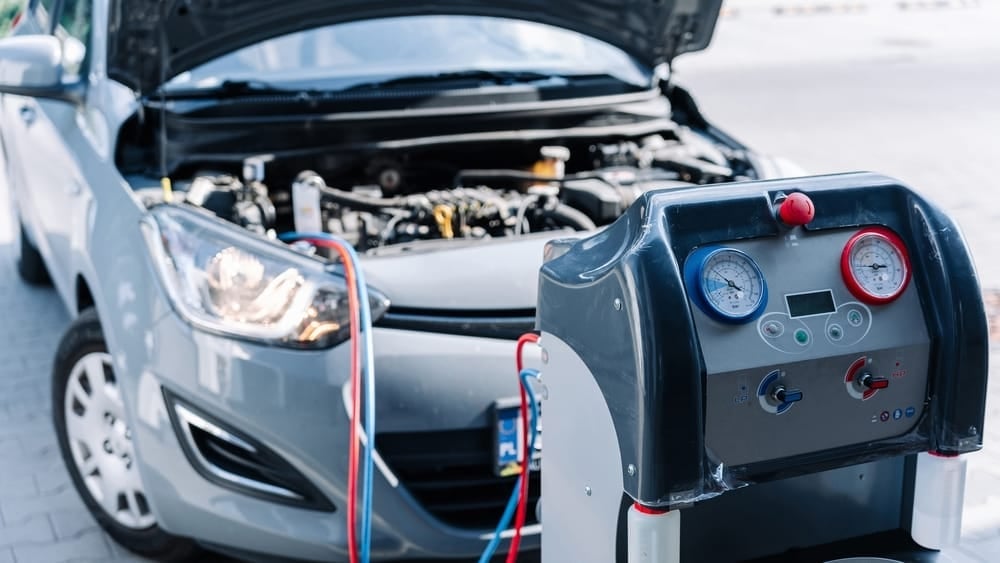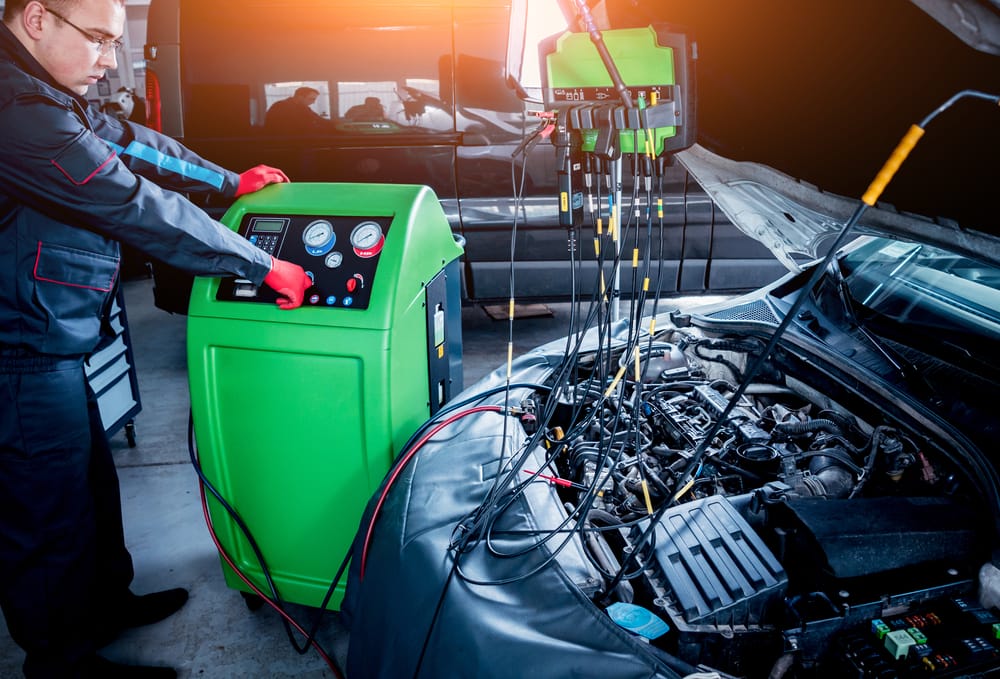
Your car's AC will not function properly with insufficient Freon.
A car can lose Freon without a leak. It happens molecularly when a
small amount of the gas, about 10% per year, escapes from the various
connections throughout the AC system. These types of leaks are
unavoidable and happen very slowly, so they typically aren't something
a car owner should worry about until the AC system stops working
properly.
When a car's AC system is low due to these "molecular leaks," it's
inexpensive to refill and often needs a quick recharge.
Below we go into how and why a car's AC system can leak without a
significant leak and what you can do about it.
 A mechanic charging a car AC system.
A mechanic charging a car AC system.
Can You Have Low Freon Without A Leak?
Yes, you can have low Freon without a leak. However, despite running
inside a closed and sealed system, AC systems in cars often experience
a slight Freon loss. This is because, at the molecular level, no system
is fully sealed. So a small amount of the refrigerant seeps out at the
system's connections, and over some time, the Freon levels in the car's
AC system will drop.
Your car's air cooling system works by circulating Freon between high and
low-pressure areas. It changes from liquid to gas, collecting heat from the
surrounding air and lowering its temperature.
The system is completely sealed, so Freon cannot escape without a leak.
However, a small amount of Freon can still leave the system at a molecular
level.
As the pressure in the system rises and falls, some gas molecules seep out
as they move along the circuit. However, the amount will be negligible, and
your car's air cooling system will continue working optimally for an
extended period before the AC system needs a recharge.
How Much Freon Loss Is Normal?
A car AC system typically loses around 10% of the total Freon inside it
annually. The Freon loss is normal if it does not exceed more than a
pound after five years.
Most cars hold about 2 to 2.2 pounds of Freon in their air conditioning
system. On average, this amount of Freon should last between 10 and 20
years. So, every year, losing 0.2 lbs of refrigerant is normal.
 Specialized equipment is needed to recharge an AC system.
Specialized equipment is needed to recharge an AC system.
How Often Do I Need To Put Freon In My Car?
No guideline specifies how often you need to put Freon in your car.
Instead, it depends on how well or poorly your car's air conditioner
performs.
While Freon should last 10 to 20 years in your car, you must add Freon as
your AC system demands.
If your vehicle's AC is performing optimally even after ten years of usage,
there is no need to regas it. But, if your AC is blowing hot air after a
year of use, you might need to inspect it for leaks, repair it, and then
put more Freon in your car.
What Causes Car AC To Lose Freon?
Besides the tiny amount of refrigerant that unavoidably seeps out at
the system's piping connections, any leak in the system can also cause
a car AC to lose Freon.
Automobile air conditioning systems can leak because of worn-out
components, contamination from moisture, corrosion, and physical damage
caused by an accident or road debris.
If the AC in your vehicle has lost Freon quickly, chances are your system
has a large leak. This leak can occur at any point of the circuit, such as
sealing, hose, condenser coil, etc., but it happens for one of the
following reasons.
 An AC system that blows warm air may be low on Freon.
An AC system that blows warm air may be low on Freon.
Worn Out Components
A car AC system is made up of a variety of materials, including rubber and
plastic, and because the system itself is exposed to the elements inside
the hot environment of the engine bay, these components tend to degrade
over time.
This degradation causes minor leaks in various parts, including O-rings,
hoses, tubes, and seals.
Corrosion
During winter, salt is put on roads to melt ice and snow. As the snow
melts, it dissolves the salt to make brine.
Exposure to salt or brine to any metal part of your car will cause
corrosion, including the metallic parts of the air conditioning system.
For example, the AC system's condenser coils are metal and can rust over
time.
Contamination From Moisture
If a leaking rubber seal, hose, or other component breaks down, it will let
moisture into the AC system.
Moisture, whether liquid, solid, or vapors, causes problems for the car AC.
The moisture mixes with Freon and creates an acidic solution. Besides
lowering the Freon level in the system, this acidic solution damages the
expansion valves, deteriorate the insulation of the motor windings in the
compressor, and breaks down the receiver/dryer or accumulator, among other
things.
Physical Damage
Your car AC can also lose Freon because of physical damage caused to the
system. This can be caused by an impact of a collision or by road debris
kicked up by the tires.
Suppose your Freon level dropped after your car got into an accident or a
rough ride. In that case, chances are your air conditioning system has a
significant leak caused by physical damage.
Conclusion
Freon is the cooling agent in a car's AC circuit. Though the system is
essentially sealed, a small amount of Freon can still escape it at the
molecular level.
Besides this, your car only loses Freon when it leaks in your air
conditioning circuit. They can happen because of worn-out equipment,
corrosion, or physical damage.
You can lose about 10% of the total Freon inside your car annually. Your
vehicle should be inspected for leaks if your loss exceeds this percentage.